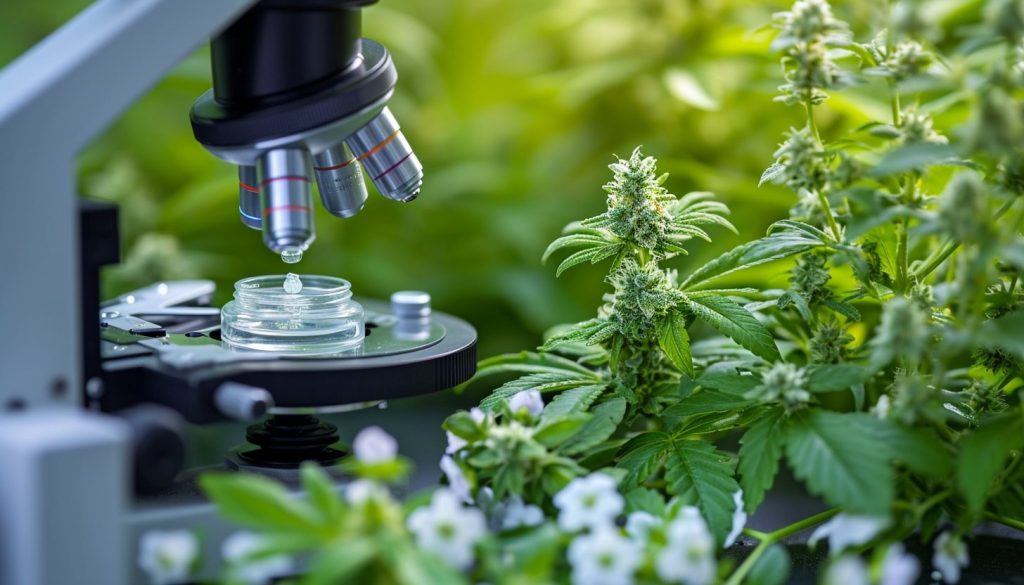The popularization of cannabidiol (CBD) in the health and wellness arena is generating growing interest in its effects on a variety of common ailments and symptoms, including fever. This article explores what is currently known about the interactions between CBD and fever, as well as comparisons with commonly used medications such as paracetamol, ibuprofen and aspirin.
Sommaire
ToggleWhat is CBD?
CBD is a non-psychoactive compound found in the cannabis plant, which has been widely studied for its potential medicinal properties. Unlike tetrahydrocannabinol (THC), the main psychoactive compound in cannabis, CBD does not cause unwanted psychoactive effects and has a favorable safety profile. Its actions on endocannabinoid receptors in our body give it a variety of beneficial effects, including anti-inflammatory, analgesic and anticonvulsant.
Connection between the endocannabinoid system and fever
To understand how CBD may interact with fever, it is important to look at the endocannabinoid system (ECS) and its role in regulating body temperature. The ECS is a cellular signaling system involved in many physiological processes, including mood, memory, sleep, and immune response.
Recent research suggests that the ECS plays a key role in regulating body temperature and may be involved in the febrile response. Endogenous cannabinoids, such as anandamide (AEA) and 2-arachidonoylglycerol (2-AG), act on CB1 and CB2 receptors in the ECS to modulate various physiological functions, including thermal homeostasis.
Anti-inflammatory function of CBD
One of the main reasons CBD has gained attention as a potential intervention for fever is its well-documented anti-inflammatory properties. Fever is often triggered by an inflammatory response to infection or other underlying causes. By targeting inflammatory processes, CBD could help reduce fever and other associated symptoms.
Several studies have shown that CBD exerts anti-inflammatory effects by inhibiting the production of pro-inflammatory cytokines and inducing the release of anti-inflammatory cytokines. This could potentially help reduce the febrile response and improve the comfort and well-being of individuals suffering from fever.
CBD and fever interaction: comparison with common medications
To better understand the potential benefits of CBD for fever management, it is helpful to compare it to other commonly used treatments.
1. Paracetamol
Paracetamol is a widely used and generally well-tolerated antipyretic (fever reducing) and analgesic (pain relieving) medication. However, some people may experience unwanted side effects, such as allergic reactions or liver problems if overdosed. CBD has less risk of serious side effects, which may be a benefit for people with fever.
2. Ibuprofen
Ibuprofen is a nonsteroidal anti-inflammatory drug (NSAID) commonly used to treat fever and pain. Although generally well tolerated, regular use of ibuprofen may be associated with an increased risk of gastrointestinal, cardiovascular, and renal side effects. In comparison, CBD appears to have a more favorable safety profile and could be an attractive alternative for people concerned about drug interactions.
3. Aspirin
Aspirin is another popular NSAID for fever and pain management. However, it poses a risk of gastrointestinal bleeding, and its use in children and adolescents is associated with Reye syndrome, a potentially fatal condition. CBD may offer benefits comparable to aspirin in terms of fever reduction, but with fewer associated risks.
Dosage and Administration of CBD for Fever
As with any treatment, the dosage and administration of CBD for fever may vary depending on individual factors such as age, weight, severity of symptoms, and other medical considerations. Additionally, some people might prefer certain delivery methods, such as CBD oils, capsules, or topicals.
It is always recommended to consult a healthcare professional to determine the correct dosage and method of administration of CBD for fever management.
Summary
In summary, although there are still some gray areas regarding the interaction between CBD and fever, early studies suggest that CBD may help manage fever through its anti-inflammatory properties and its ability to modulate the endocannabinoid system. Comparisons with other commonly used treatments, such as paracetamol, ibuprofen and aspirin, show that CBD could offer a promising alternative with less risk of unwanted side effects. As always, it is recommended to consult a healthcare professional before using CBD for fever or any other symptoms.



